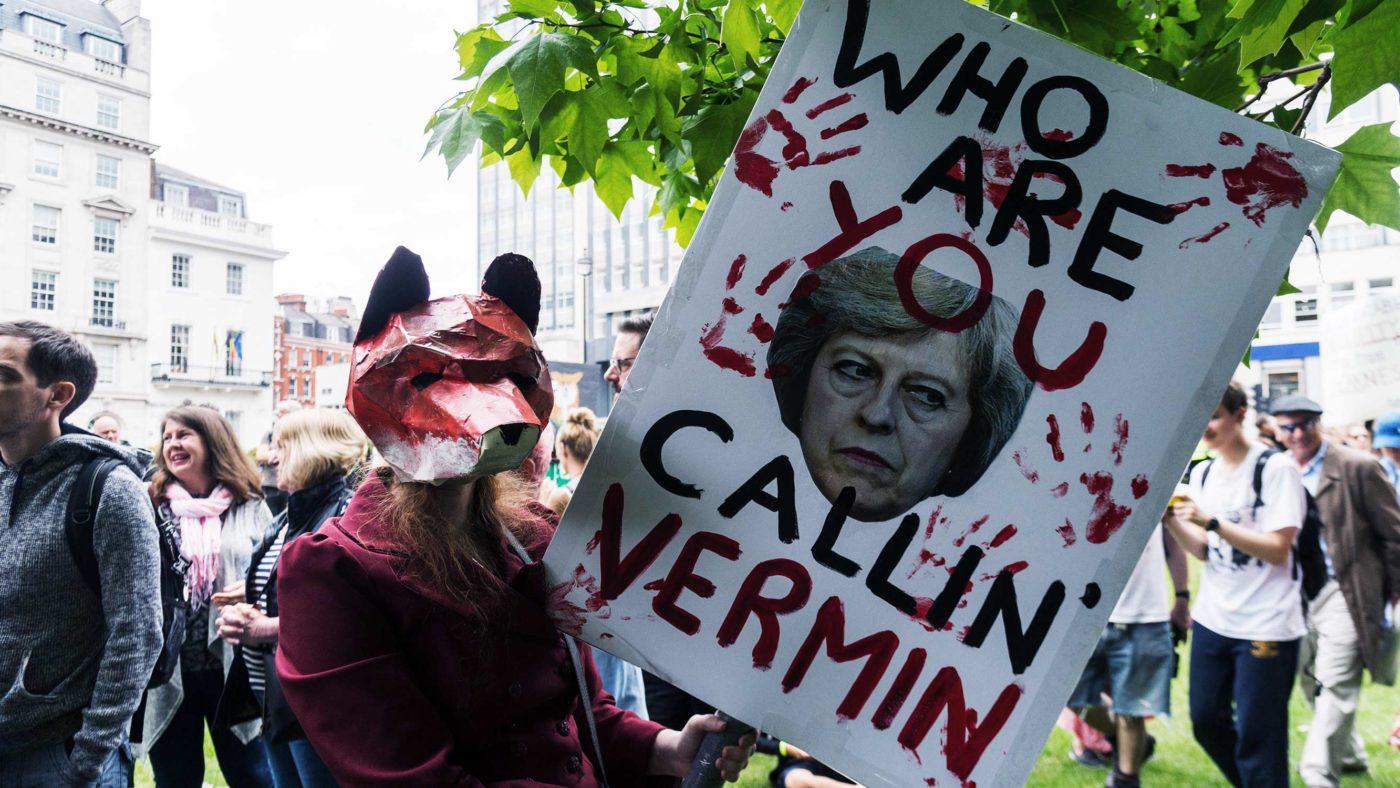Over the Christmas week, CapX is republishing its favourite pieces from the past year. This was first published on June 9.
The most surprising conversation I had during this campaign – and with hindsight, the most telling – was with Conservative activists in Wirral West. They were fighting to overturn a razor-thin Labour majority. And at the beginning of the campaign, even the closest polls pointed to the constituency being an easy gain.
But with just over a week to go, things were proving more difficult than they should have been. What policies from the national campaign, I asked the activists, are making things difficult on the ground? “Fox hunting,” one of them shot back.
Not the “dementia tax”, not cuts to police numbers, not the NHS, but fox hunting. The issue lit up their mobile phone screens with Twitter notifications and clogged up their Facebook newsfeeds. It cropped up on the high street and on the doorstep.
When the election was called, few would have thought the issue would play even a walk-on part. But then Theresa May took the opportunity to reiterate that there would be a free vote on fox hunting – and that, since someone was asking, she was perfectly happy to vote in favour.
The problem with this, said the activists in Wirral West, wasn’t that their constituency was a hotbed of animal rights activism where voters’ number one concern was making sure foxes weren’t torn to bits by hounds. It was that choosing to talk about hunting made the Tories look like the same old Tories.
These activists, all of whom live in or near Liverpool, knew how electorally devastating it is to be seen as the same old Conservatives. But sure enough, that appears to have been the verdict of voters, with Margaret Greenwood adding 5,000 votes to her previously wafer-thin majority.
What was true in Wirral West appears to have been true across the country. Buzzfeed has been tracking the most shared subjects on social media during the campaign. In what was supposed to be the Brexit election, the EU actually came in at number eight, two places behind hunting. And yes, the internet is an echo chamber. But it shows what people on both sides are really getting steamed up about.
Yet if hunting was the totemic, easily shareable proof that the Tory mask had slipped, the bigger picture was one of a country in which the Conservatives have spent seven years in power, overseeing spending cuts.
In a fascinating interview on the CapX podcast this week, the BBC’s polling guru, John Curtice, explained that the British public’s attitudes to taxation and spending are “basically counter-cyclical. If a government comes in and tries to reduce spending and taxation, after a while people will get worried about the state of public services… It’s basically impossible to satisfy the public.”
David Cameron and George Osborne were acutely aware that even when a senior member of the outgoing Labour government had admitted that “there’s no money left”, their spending cuts had to be vigorously and repeatedly explained and defended. Difficult decisions had to be made, so the public needed to be endlessly reminded of what it was all for.
If Prof Curtice is right – and he usually is – overseeing spending cuts only gets harder. Yet even though Theresa May actually eased the pain somewhat, by pushing back the elimination of the deficit, she didn’t actually boast about it. Nor did she defend the cuts her party still planned to make – and explain, as Cameron and Osborne did, why those cuts were so necessary.
This ties in to another big mistake – one people in politics keep repeating. It’s to think that a politician’s background matters.
People scoffed at the idea of Nigel Farage, a privately educated ex-stockbroker, could become the spokesman for working-class voters disillusioned with Labour. They scoffed at the idea that Donald Trump could do something similar in the US. And they assumed – not least within Downing Street – that because Theresa May didn’t go to Eton, people would assume she was on their side.
May’s plan was to raid Labour’s Northern heartlands, using Brexit to win round Leave- and UKIP-voting former Labour supporters. That meant that persuading people of her good intentions – and not being seen as the same old Tories – was more important in this election than most.
Last night was a reminder that convincing people to vote Conservative for the first time is difficult – especially in parts of the country where “Tory” has, for generations, been a dirty word. Results in the Brexit heartlands suggest that UKIP was not the gateway drug to Conservatism May had banked on. Instead, with the Brexit box ticked, most 2015 UKIP voters seem to have returned to their old parties.
Her calculation was that she could afford to risk alienating voters in Remainia if it meant conquering Leaveland. But instead she ended up caught between the two – alienating metropolitan Conservatives much more comfortable with David Cameron’s version of Tory modernisation (just look at the results in London) while looking like Just Another Tory to the working-class voters in the parts of the country she failed to paint blue.
Perhaps the best way to understand all this, alongside Leave vs Remain, is in terms of the Anywheres and the Somewheres – the two political and social tribes described by David Goodhart in his new book, which he recently discussed with CapX. May abandoned the former, without realising how much it would take to win over a large enough chunk of the latter. And getting caught between Somewhere and Anywhere, we learned last night, is the road to nowhere.


